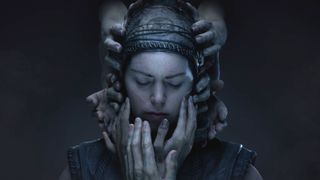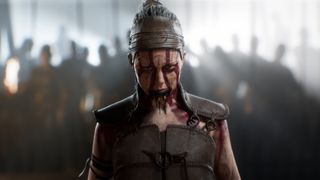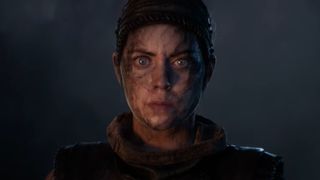With Senua's Saga: Hellblade 2, Ninja Theory is learning from player feedback and past experience in its sustained push to challenge mental health stigma
Interview | How Hellblade 2 is building on the foundations laid by 2017's Senua's Sacrifice

Senua's Saga: Hellblade 2 is not just the follow-up to the action-adventure series' predecessor, but the culmination of a seven-year journey for developer Ninja Theory. Launched in 2017, Hellblade: Senua's Sacrifice was received well by players and critics alike, accruing multiple awards for its engaging dark fantasy narrative inspired by Norse mythology and Celtic culture, and its depiction of psychosis – the latter of which was portrayed via the eponymous protagonist on-screen, and underpinned by thorough consultation with medical professionals off it.
Between games, Ninja Theory was acquired by Microsoft Gaming, adding an extra layer of expectation to the studio's upcoming sequel. Having made such a concerted effort in its bid to challenge mental health stigma during its first outing, there is likewise a degree of pre-release anticipation for Ninja Theory to carry similar commitment forward, both thematically and mechanically, into number 2. Laurie Dunham, Senua's Saga: Hellblade 2's script writer and director of performance capture, enters the fray relatively new having not worked on the first game – but says the process has remained the same since pre-2017.
"Coming in, the big takeaway from the first game for me was how it really resonated with people, who maybe have had the same experience as Senua and couldn't find a way to communicate that with other people," says Dunham. "That idea of being seen and understood is so important, and is [why we choose to] approach the sequel in a very similar way – to speak and listen to people with lived experience, to get their insights and make something that's faithful and accurate."
Professional help

This faithfulness and accuracy is levied in part by Ninja Theory's meticulous approach to research and support. Paul Fletcher, a psychiatrist and professor of neuroscience at Cambridge University, returns in a similar advisory capacity for Senua's Saga: Hellblade 2, and says that some of the earliest pushback to the exploration of psychosis came before work on the first game had even begun. And while born from a place of apprehension and scepticism, simply having conversations became crucial in Hellblade's initial steps in approaching and portraying such sensitive subject matter.
"I believe these early conversations, to some extent, mitigated concerns," says Fletcher. "The feedback we went on to receive from the first game was just, to me, utterly unexpected and so gratifying and validating. But I did read one article in which the writer said, 'Well, this, this does not reflect my psychosis. This is a mistake, it doesn't deal with a very core part of it, which is how it affects my relationships with others, and the social component.'"
"I'm not saying that article was what spurred [everything in] the sequel, it was certainly something that I've thought a lot about. It's been great to see Laurie and the team working with Senua in a new setting, where she is meeting other people and her reality is actually conflicting or sometimes overlapping with theirs, and seeing where that takes the story."
In doing this, Dunham says that while the first game took Senua to a place of relative peace and acceptance, the sequel marked a chance to continue the protagonist's journey; to expand and enlarge her world, her challenges and her goals. Senua's relationships with those around her are "absolutely key", says Dunham, as are how Senua herself is received by others in-line with their perspectives and how they view the world themselves.
To this end, Fletcher compares the challenges of this two-way dynamic to his real-world experience wherein consideration is given to how inner voices might respond to outer voices, and how uncomfortable this contradistinction can be for individuals. "I think being able to represent this in-game has enriched the experience," Fletcher says.
Sign up to the GamesRadar+ Newsletter
Weekly digests, tales from the communities you love, and more

"What are truly our aspirations beyond success as a game, a story, and an artistic experience?"
On a more granular level, while keeping the specifics close to his chest, Fletcher says that Senua's Saga: Hellblade 2 includes certain representations of psychosis that weren't present in the first game – emerging from conversations held in the intervening period, and captured with powerful results. Keeping the fantastic elements of the game grounded in reality is only possible by virtue of constant consultation between the dev team and those with lived experience of psychosis, with Fletcher underscoring the importance of not falling back on lazy tropes or harmful stereotypes.
For Dunham, maintaining a level of intention throughout the development process has helped steer clear of these pitfalls. "We tried to be intentional about what we're doing, to understand where it might have come from for Senua and what its limits are," she says. "It's not everything, but a specific thing that has a specific kind of resonance to her, and a specific meaning to her in the situation. It's not just noise."
Fletcher interjects: "That's a great point. There are instances with psychedelic drugs where you can actually create a sort of neural noise that is relatively devoid of meaning, but that's not psychosis. And I think, staying true to that, the fact that it has meaning and it's based upon experiences stops you crossing that line."
Mind games

Through all of this, one of Dunham's overarching goals is to increase understanding with the corollary of reducing stigma. Dunham is very clear that Senua is not defined by her psychosis – "she's on another journey as well" – but if the first game was about laying the foundations for relatable psychosis portrayal, Senua's Saga: Hellblade 2 is about exploring the subject deeper and building on the great work Hellblade: Senua's Sacrifice delivered in 2017.
The persuasive nature of video games naturally lends a degree of credibility to this process that's impossible via more traditional media. As players, we step into Senua's shoes, we become the character and take on their trials and tribulations on a personal level. Whether or not we have a first-hand understanding of psychosis is a different consideration, but Ninja Theory's aim remains: to help us appreciate what the game's protagonist is going through, and to enlighten based on real people's lived experience and professional insight.
Success on these fronts is difficult to quantify, but again it's the conversations that Ninja Theory's groundbreaking work in this space has helped instigate that both Fletcher and Dunham cherish.
"What are truly our aspirations beyond success as a game, a story, and an artistic experience? There was certainly an instance, following the first game in which a woman made contact with the studio and said that her son had been considering suicide," says Fletcher. "He played Hellblade and felt sufficiently understood, that he then went to seek help. That sort of thing is a possibility. And I do think that just in the right place at the right time, if you give the right message, it's amazing how that can switch the rails and send someone in a different direction. So, you can dare to hope."
Dunham adds: "I think that's a perfect way of putting it: one can dare to hope. If there's a chance that something like Hellblade could help someone, then I wholeheartedly hope it does."
Senua's Saga: Hellblade 2 is due to launch on PC, Xbox Series X, and Game Pass on May 21, 2024.

Joe is a Features Editor at GamesRadar+. With over seven years of experience working in specialist print and online journalism, Joe has written for a number of gaming, sport and entertainment publications including PC Gamer, Edge, Play and FourFourTwo. He is well-versed in all things Grand Theft Auto and spends much of his spare time swapping real-world Glasgow for GTA Online’s Los Santos. Joe is also a mental health advocate and has written a book about video games, mental health and their complex intersections. He is a regular expert contributor on both subjects for BBC radio. Many moons ago, he was a fully-qualified plumber which basically makes him Super Mario.
- Josh WestUK Managing Editor, GamesRadar+
Most Popular






